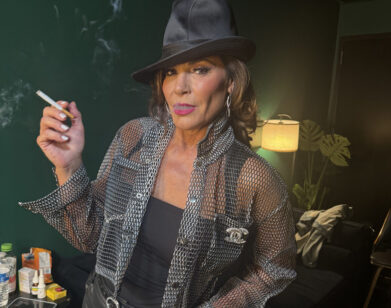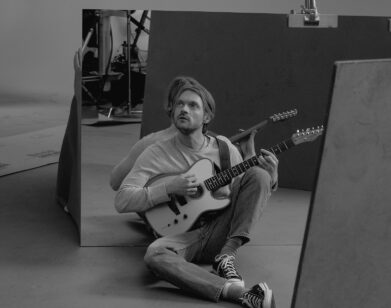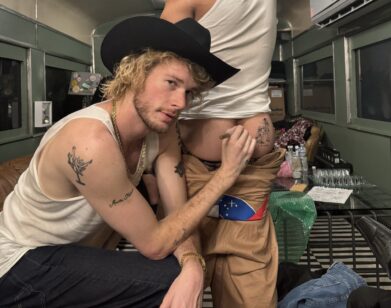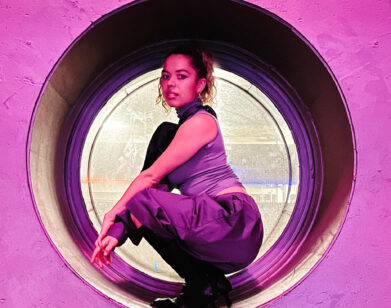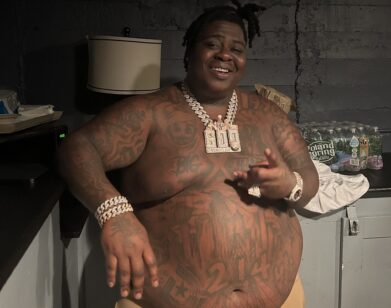Exclusive EP Premiere: ‘ELEL,’ ELEL
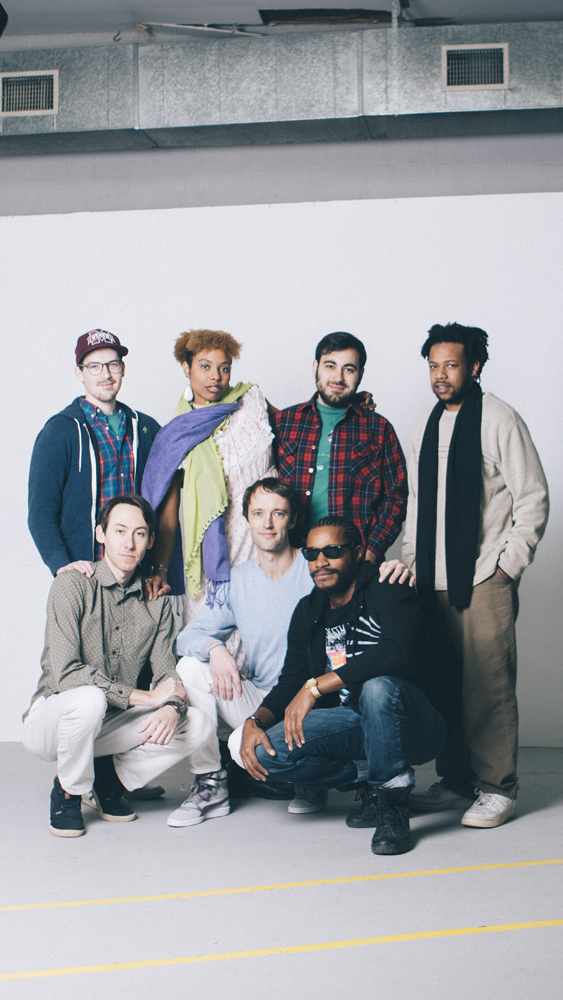
ELEL IN NASHVILLE, JANUARY 2015. PHOTO BY ALIC BROCK.
Varying between six and eight-piece sets, up-and-coming indie pop band ELEL might not be what typically comes to mind when thinking of Nashville’s music industry. During live shows, sometimes two drummers, and sometimes two horn players, but always at least one of each take the stage, alongside two pianists, three guitarists, four vocalists, and one bassist. Since the eight musicians first came together one and a half years ago, Ben Elkins, Zach Tichenor, Tim Cook, Jo Jo Jackson, Alex Mojavarian, Jerry Pentecost, Fredrick Weathersby, and Stefan Forbus have intermixed and overlapped responsibilities, oftentimes improvising on the spot, letting songs and audiences guide them. The result is resoundingly catchy and layered pop music, with lo-fi samples captured straight off the record player.
ELEL, a composite of frontman Elkins’ surname and his wife’s first name (she is not in the band and goes by Lisa, but her given name is Eliska), just finished touring with the Generationals and will release their self-titled EP on March 3 via New York’s independent label Mom+Pop. Prior to its release, we’re pleased to offer an exclusive stream of ELEL here. We spoke with Elkins over the phone, who says ELEL’s music is like a yoga class in comparison to the high-energy, frantic nature of his prior bands.
EMILY MCDERMOTT: So when did you meet your wife and then when did you decide to form ELEL?
BEN ELKINS: We met each other probably a little over five years ago. I was going through a big transition in life in a lot of ways. I was actually going through a divorce. I fronted another band before, which we worked pretty hard on for six or seven years, and it kind of plateaued. So that was transitioning to wanting to do something different and meeting Lisa. She started introducing me to some music I didn’t know about that was kind of new and up-and-coming at the time, like Beach House and Toro Y Moi. I was drawn to this softer style of music and saw how powerful it can be, so the music I started working on was calmer and had more space. It initially was continuing for my other band, but it became apparent that this was different enough and I should give it a fresh start. We ended up parting ways and I got a bunch of new people on board.
MCDERMOTT: What was the music you were listening to and playing before like?
ELKINS: It was more frantic and aggressive. We were really energetic on stage. Our energy that we put into this was pretty hard, almost like The Dillinger Escape Plan, but not at all hard music. It was more like a highly intense aerobic class, and I feel like what we do now is more like the yoga class.
MCDERMOTT: That’s funny because I wouldn’t categorize you as playing at a slower pace.
ELKINS: [laughs] That’s probably a bad analogy too, but at least it’s more to that side of things. I don’t know if it comes across as less energetic, but to me it feels a lot calmer. Maybe it’s just that I feel stronger about it. It’s a lot of different instruments. It’s mostly keyboards; there are three keyboards. Also, there’s just a lot more people in this band. There’s seven of us.
MCDERMOTT: Why did you want to work with so many people?
ELKINS: A lot of it was a reaction to playing with background tracks in the past and wanting do everything live, to have the flexibility of having an actual live show that is different every night. Meeting all these people that are in ELEL, that I feel so close to now, all happened pretty quickly, within about six months. Four of us worked at a Trader Joe’s in Nashville and that’s where I met all of them. I met Fredrick, the trumpet player, at a benefit we were both playing at. Eventually he started coming around, became part of the band, and then one day he showed up with this other guy who had a saxophone in his hand. He didn’t ask; he just brought this guy along. I was like, “Hey, you want to play one of these songs?” so he wasn’t just sitting there in the corner with his saxophone, and he quickly became a regular part of the band.
It was a little bit out of my control. I didn’t necessarily want this band to become that big but…the way it came together seemed like it didn’t take much work. It just took me asking people and they were totally up for it. There are a lot of people on stage, but we play really sparsely, all of us, to create this layered sound, not really, really full, you know? Sometimes it gets pretty full, but a lot of the times it’s intricacies over a basic groove.
MCDERMOTT: What are shows like? Is everyone always at every show?
ELKINS: There’s one guy—the second drummer—that’s sort of a 50/50. A lot of the time we only play with one drummer, but for bigger shows, and especially shows in Nashville, we’ll have two drummers. Then there’s eight of us. We’ve done a few shows with just six people, meaning only one horn player instead of two, but besides that, it’s almost always seven of us.
It’s difficult to manage that many people and personalities, but the payoff is so strong. We had a practice last night and everybody ended up bringing their own musical personalities to the table. The song changed so much from what the initial recordings were. I almost want to re-record the album and put that out also, because all the songs have become such neat, live versions. It certainly resonates with me on a really deep level. There’s something special about it, better than anything I’ve ever been involved in for sure.
MCDERMOTT: Do you do all of the music- and lyric-writing or is it a collaborative process? What is that like for you?
ELKINS: I’m not saying it will always be like this, but so far I’ve been the one who writes the music and lyrics and also does a lot of the arranging. It’s pretty important for me to spend a long time on my own with my headphones, developing the foundations of a song. That’s a painstaking process I’m going through right now. I feel like I’m a terrible songwriter in the process of it. [laughs] I go through this stage where I think I’m terrible and then eventually I settle down where I’m like, “Okay, I really think I like it now.” But I don’t know if that will always be the case. There’s some very talented people in the band. Zach for instance, is a songwriter and producer in his own right, so at this point I get a demo to a certain point and pass it on to him and see what he thinks and what he wants to add. It’s starting to be more like that with new songs.
MCDERMOTT: Where do you find inspiration for your music?
ELKINS: A lot of it is music that I’m listening to, and for the last year it’s been Vampire Weekend’s latest record, which I just love—the way it sounds and the arrangements and the combination of things that don’t seem to necessarily fit together but somehow work. For the album and even for the EP, a lot of that was influenced by Beach House—seeing Beach House live in Nashville, listening to their stuff a lot—the strengths in that kind of music, even though there’s not a whole lot going on, it’s really calm, but it’s emotional. It’s so powerful.
I like a certain amount of randomness, meaning that so much today is so exact and perfect because we can do music on computers. I don’t think this is going to last very long—we’re going to realize this music culture is not like us, so why would we want it? We’re a little messy, we’re not perfect, we have scars, and we look a little bit weird but that makes us comfortable because that’s who we are. I really enjoy putting in percussion bits or string samples that are imperfect because even though it might not sound right if you’re just listening to that, once you put it in the mix, the whole thing sounds warmer, more comfortable, and more beautiful. On “40 Watt,” there’s this old instrumental—two jazz records from the ’60s, I pulled a lot of parts off my record player. It’s my favorite thing, grabbing parts that were recorded by real people years ago.
MCDERMOTT: Who are some of these people you pull from?
ELKINS: These aren’t famous people. Actually, these records were put out as instrumental, test-the-quality-of-your-sound-system. They’re not good, but there are percussion parts and it’s got all this record noise, low-end hum. It’s pretty lo-fi and out of time, but you drop that stuff in there and it makes the song come alive. If you did it with a modern sample, it wouldn’t be the same. That’s something I really love. I’m curious about how the perfection of music is going to play out next 10 or 15 years.
MCDERMOTT: So with imperfection, do you improvise a lot?
ELKINS: Live, yes! We have solo sections for Stefan and Fredrick, the horn players, and two or three guitar sections that change every night. That’s something that I talk a lot about: we can’t define this part of the song or else it’s going to die. We have to watch each other and let it be whatever it’s going to be. It’s not, “four times on this and four times on that.” That’s another product of how we record music on computers: we think about everything pieced together, so when you come to practice the song live, you see it in sections—now the drums come in, now the bass comes in. I try to let things grow and overlap and sound more organic. You’re not quite sure why it’s like this or if it’s going to be like this, but man, when it works, it makes me thrilled. I think it resonates with other people as well.
MCDERMOTT: How long have you been playing music? When did you first become interested in music?
ELKINS: There’s actually two very different answers for those things. I’ve been playing music almost my whole life; I started playing violin when I was two-and-a-half years old. I was really, really small, and my mom was a piano teacher at the Suzuki Music School. I was eventually taking piano too, but I played violin for four or five years in the Suzuki School, which focuses a lot on ear training and hardly not at all on music reading. Are you a musician, Emily?
MCDERMOTT: No, I’m not. My mom made me go to classes, but it never went so well.
ELKINS: Same kind of thing for me, I was forced to practice. I’m sure that now if I took those lessons I’d probably love it, but back then it was a chore. I ended up taking piano and drums, and I’m really thankful for that foundation of ear training, the violin, and rhythmic stuff. I didn’t start guitar until I was in high school. By that time, I had stopped all music stuff. I just wanted to be a professional basketball player, which, needless to say, there was no reason for me to expect to become a professional basketball player. I started playing the guitar because I wanted to learn “More Than Words,” a great Extreme song. That’s when I really started playing because I wanted to, mostly learning to play pop tunes and “Stairway to Heaven,” of course. I’ve become less ashamed of this over the years, but I’ve always been into straight-up pop music. I wasn’t one of those kids who listened to anything anyone would consider cool now, for better or for worse, I don’t know. I don’t necessarily love most pop music now, but I really was all the way into Top 40 things in junior high.
MCDERMOTT: What was the first album you bought?
ELKIN: It was actually Sheryl Crow. [laughs] That was my first CD. Actually, I’ve listened to that recently, there’s some really awesome stuff. That’s still a stand-up album. I did a lot of Boyz II Men, that kind of thing.
MCDERMOTT: Did you go to school for music? Or did you just pursue it after high school?
ELKIN: I went to school at the University of Arkansas and ended up getting a music degree. It’s a classical based program, so a lot of the stuff that I took, like operatic voice, were not very beneficial to me, but there were some things, like the jazz history class, that were amazing. Then there were some ear training classes I loved and music theory—I can really get into talking about music theory, which is not a very popular subject with most people. I definitely use some of that, especially the theory and the ear training, every day. I like academic skills of music, which is another thing not really prevalent in Nashville. My mom used to take me and my sister to the symphony and I remember seeing the conductor. Every time before they started the piece, he would look around at his orchestra and he’d be pointing as his forehead, which means, “Think about what you’re doing in this piece, be aware.” That’s something I find myself doing with my band, because it’s a matter of being present—being present with everybody and what we’re doing would mean the difference in that song that we’re playing. That specific moment is huge if everybody is in it.
YOU CAN PRE-ORDER ELEL VIA ITUNES. FOR MORE INFORMATION, VISIT THE BAND’S FACEBOOK.

